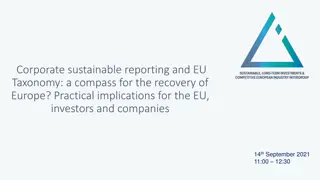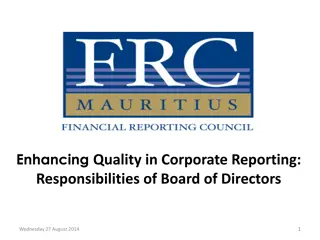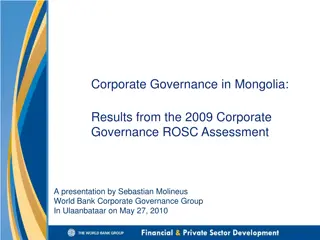Social Reporting in Corporate Sector
Social reporting involves the measurement and reporting of a business enterprise's activities that impact society. It focuses on the social impact, societal obligations, and social accounting practices within the corporate sector.
Download Presentation

Please find below an Image/Link to download the presentation.
The content on the website is provided AS IS for your information and personal use only. It may not be sold, licensed, or shared on other websites without obtaining consent from the author.If you encounter any issues during the download, it is possible that the publisher has removed the file from their server.
You are allowed to download the files provided on this website for personal or commercial use, subject to the condition that they are used lawfully. All files are the property of their respective owners.
The content on the website is provided AS IS for your information and personal use only. It may not be sold, licensed, or shared on other websites without obtaining consent from the author.
E N D
Presentation Transcript
S SUBJECT UBJECT: :- - C CORPORATE C CLASS LASS: :- -M. T TOPIC OPIC: :- - S SOCIAL BY: BY:- - P PROF ( (ASSISTANT ASSISTANT P PROFESSOR D DEPARTMENT EPARTMENT OF OF COMMERCE ORPORATE A ACCOUNTING M.COM COM 2 2ND ND S SEMESTER OCIAL R REPORTING EPORTING ROF.R .RUCHIKA UCHIKA B BATRA ROFESSOR) ) COMMERCE & M & MANAGEMENT CCOUNTING EMESTER ATRA ANAGEMENT College:-I.B.(P.G)College,Panipat Affiliated To Kurukshetra University,Kurukshetra
SOCIAL REPORTING Introduction Social reporting is defined as reporting of some meaningful, definable domain of a business enterprise s activities that have social impact. Put another way, social reporting implies the measurement and reporting, internal or external, of information concerning the impact of a business enterprise and its activities on society.
MEANING An objective of financial statements is to report on those activities of the enterprise affecting society which can be determined and described or measured and which are important to the role of the enterprise in its social environment. It is not wrong to say that business is a social unit,uses society s resources and produces goods and services for the society.Society provides infrastructural and other facilities for the convenience of the business operations.
SOCIAL RESPONSIBILITY OF BUSINESS Meaning: Social responsibility of business implies the obligations of the management of a business enterprise to protect the interests of the society. According to the concept of social responsibility the objective of managers for taking business decisions is not merely to maximize profits or shareholders value but also to serve and protect the interests of other members of a society such as workers, consumers and the community as a whole.
SOCIAL ACCOUNTING Meaning Social accounting. Similar to traditional accounting, it is a method of quantifying a company s performance. Only with performance is used broadly to include social and environment effects. accounting is first and foremost social accounting,
DEFINITION Social Accounting is the process of measuring, monitoring, and reporting to stakeholders the social and environmental effects of an organization s actions. Social accounting aims to assess the impact of an organisation or company on people-both the internal and external participant environments.
APPROACHES TO SOCIAL ACCOUNTING On the recommendations of the report by the Public Affairs Council in 1971,David F.Fetyko suggested a workable format for social reporting based on the following approaches. The Invenory Approach:-It covers the company s total social objectives. Cost/Outlay Approach:-Expenditure on each activity is disclosed separately. The Programme Management Approach:- Statement Regarding the compliance with the objectives activity wise or otherwise is recorded. Benefit Cost Approach:-The real worth is known and indicated i.e. the benefit due on expenditure.
MEASUREMENT OF SOCIAL COST BENEFIT Measurement of social costs and benefits of a specific project,in monetary terms,precisely is not a feasible task.By making analysis of the social aspects associated with that project may become the basis of acceptance or rejection on social grounds. The criteria to be used to measure the social cost benefit of a particular project are as follows:- Capital Output Ratio:- This ratio tells the expected output in relation to the capital invested in the project.The larger the ratio,the better it is. A project which is giving higher output per unit of capital employed is better than a project giving lower output to capital.
CONTD. Capital Output Ratio = Total Output in rupees Total investment in rupees This method is useful in developing countries where there is a shortage of capital resources.
CONTD. Value Added Method:- This method considers the net contribution made by the business to nation s economy and is calculated by applying the following formula :- Value Added= Sales Value-Cost Of Inputs A project having higher value added will be preferred to the project having lower value added.
CONTD. Employment generates opportunities(especially in case of developing countries like India where there is a problem of unemployment),the society will be benefitted.So ,a project having more employment potential is preferable to the project having less employment potential. Opportunities:-If more a employment project
CONTD. Savings in Foreign Exchange:- Acceptance or Rejection of a project also depends on savings in foreign exchange.A project having higher benefits in terms of foreign exchange shall be preferred. Cost Benefit Ratio:-According to this method,the social cost and socaila benefit are ascertained. Social Cost= All Monetary Costs + All Non Monetary Costs Social Benefits= All Monetary Benefits + All Non Monetary Benefits























